A new Colorado State University (CSU) study commissioned by Keep It Colorado and the Colorado Cattlemen’s Agricultural Land Trust (CCALT) demonstrates the important economic impacts that potential future funding from the federal agricultural conservation easement program (ACEP) could have on the state of Colorado.
The study concludes that if $88.9 million in federal ACEP payments (the estimated current need for active conservation projects in Colorado) were secured, this funding would generate up to $195 million in economic activity and create more than 1,200 jobs in Colorado. The investments would help bolster the state’s rural economies, as the study estimates that as much as 80 percent of this economic activity would be directed to rural communities.
In Colorado’s rural agriculture communities, economic opportunity, employment and financial safety nets are less diverse and robust than in urban areas, making these communities less resilient to economic shocks resulting from drought, fire, and the COVID pandemic. Programs such as ACEP provide rural communities greater certainty and opportunity by helping to reduce farm debt, increase savings, and mitigate risk.
The study, titled “Economic impact of future federal conservation easement investments on (rural) Colorado communities,” makes the case for activating federal funding to convert pending conservation projects into completed conservation easement transactions. The infusion of financial stimulus would trigger a host of advantages for Colorado’s rural economies and further position Colorado as leader for conservation in ways that other states could replicate. High-level findings include:
- A dozen Colorado land trusts have a current and pending project portfolio of 151 properties comprising 185,395 acres of Colorado private working landscapes with an estimated conservation easement value of about $325 million.
- 74% of the 151 properties, 83% of the acreage, and 69% of the easement value are located in rural Colorado counties.
- Investment in Colorado’s currently pending agricultural conservation easement projects could generate $195 million in new economic activity in the state.
- This new economic activity creates 1,233 new jobs at an average wage of $50 thousand per year and $97 million in additional economic value (e.g., profits, wages, interest, rent, taxes) in Colorado.
- Financial stimulus of this kind is of critical importance now in view of the effects of the current public health pandemic on the financial health of the agriculture sector.
- This financial injection provides an important source of debt service and risk mitigation support for rural landowners and stimulus to rural communities.
- It is reasonable to expect similar effects of investments in conservation easements in other states.
Keep It Colorado and CCALT commissioned CSU professor and associate head of CSU’s Department of Agricultural and Resource Economics, Andrew Seidl, to complete the research. Funding for the study was supported by The Trinchera Blanca Foundation, founded by conservation philanthropist Louis Bacon. Gates Family Foundation has been the state’s largest source of private matching funds for public-private land protection, since the launch of Great Outdoors Colorado in 1992.
Available on Keep It Colorado’s website are:
- The seven-page study, “Economic impact of future federal conservation easement investments on (rural) Colorado communities.” Download here.
- An infographic illustrating the impacts, “Economic Return on Farm Bill Investments.” Download here.
ACEP helps landowners, land trusts, and other entities protect, restore, and enhance wetlands, grasslands, and working farms and ranches through conservation easements. Over the past 25 years, the Natural Resources Conservation Service of the U.S. Department of Agriculture has worked with landowners to protect more than 4.4 million acres of wetlands and agricultural lands, a value of over a billion dollars in a diversified real estate portfolio that has resulted in improved soil health, water and air quality and wildlife habitat.
About Keep It Colorado
Keep It Colorado is a nonprofit coalition of land trusts, public agencies and conservation champions that is driving a new conservation movement in Colorado. The members’ on-the-ground initiatives in local communities are working to ensure that Colorado’s people, lands, waters and wildlife thrive – and that our natural outdoor spaces and places stay beautiful and protected forever. To support coalition members in their work, Keep It Colorado serves as a unified voice that advocates for sound public policy; provides connection and collaboration opportunities; offers a forum to address emerging issues and opportunities around conservation; and engages communities on the importance of conservation for our state’s future. Learn more at www.keepitco.org.
About Colorado Cattlemen’s Agricultural Land Trust
The Colorado Cattlemen’s Agricultural Land Trust (CCALT) is a nonprofit land conservation organization whose mission is to “…conserve Colorado’s western heritage and working landscapes for the benefit of future generations.” To date, CCALT has conserved more than half a million acres across Colorado and partnered with more than 350 ranching and farming families. Learn more at www.ccalt.org.
About The Trinchera Blanca Foundation
The Trinchera Blanca Foundation, the Colorado affiliate of The Moore Charitable Foundation, founded by Louis Bacon in 1992, supports organizations committed to protecting land, water and wildlife habitat in Colorado’s San Luis Valley. The Trinchera Blanca Foundation also supports community programs dedicated to improving quality of life in the surrounding region. Learn more at www.moorecharitable.org.

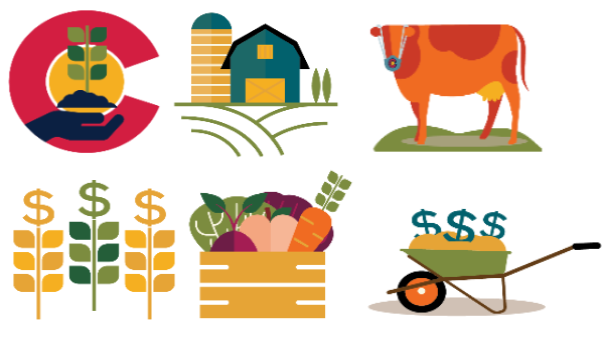
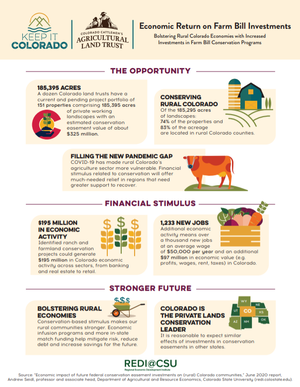









 Finally, also in 2023 a total of $410,956 previously committed by Gates to the
Finally, also in 2023 a total of $410,956 previously committed by Gates to the 
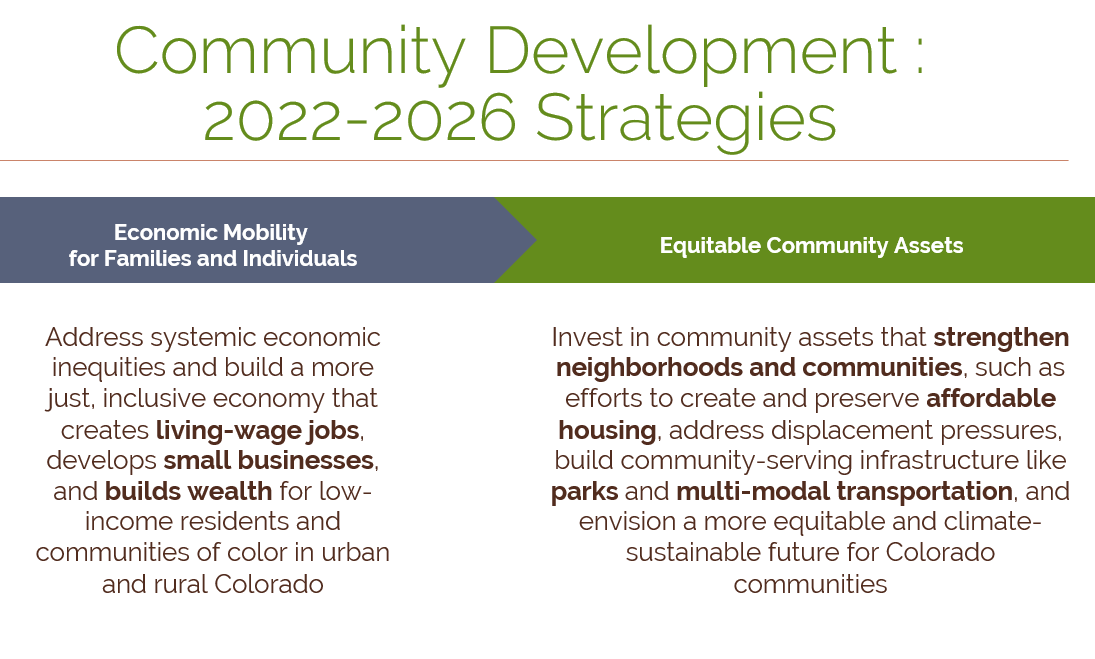

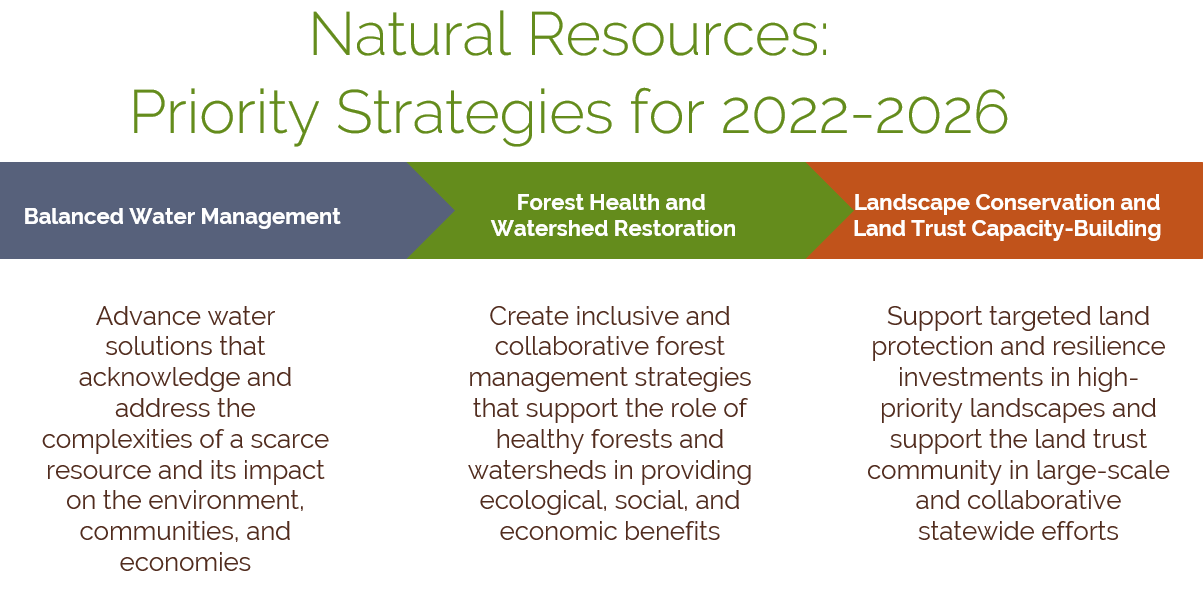
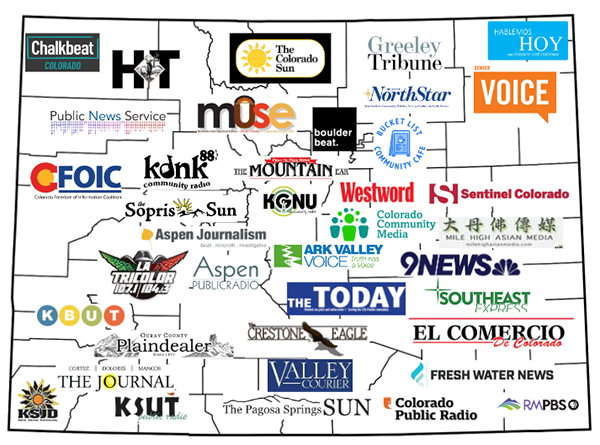 A total of $1,110,956 committed to the
A total of $1,110,956 committed to the 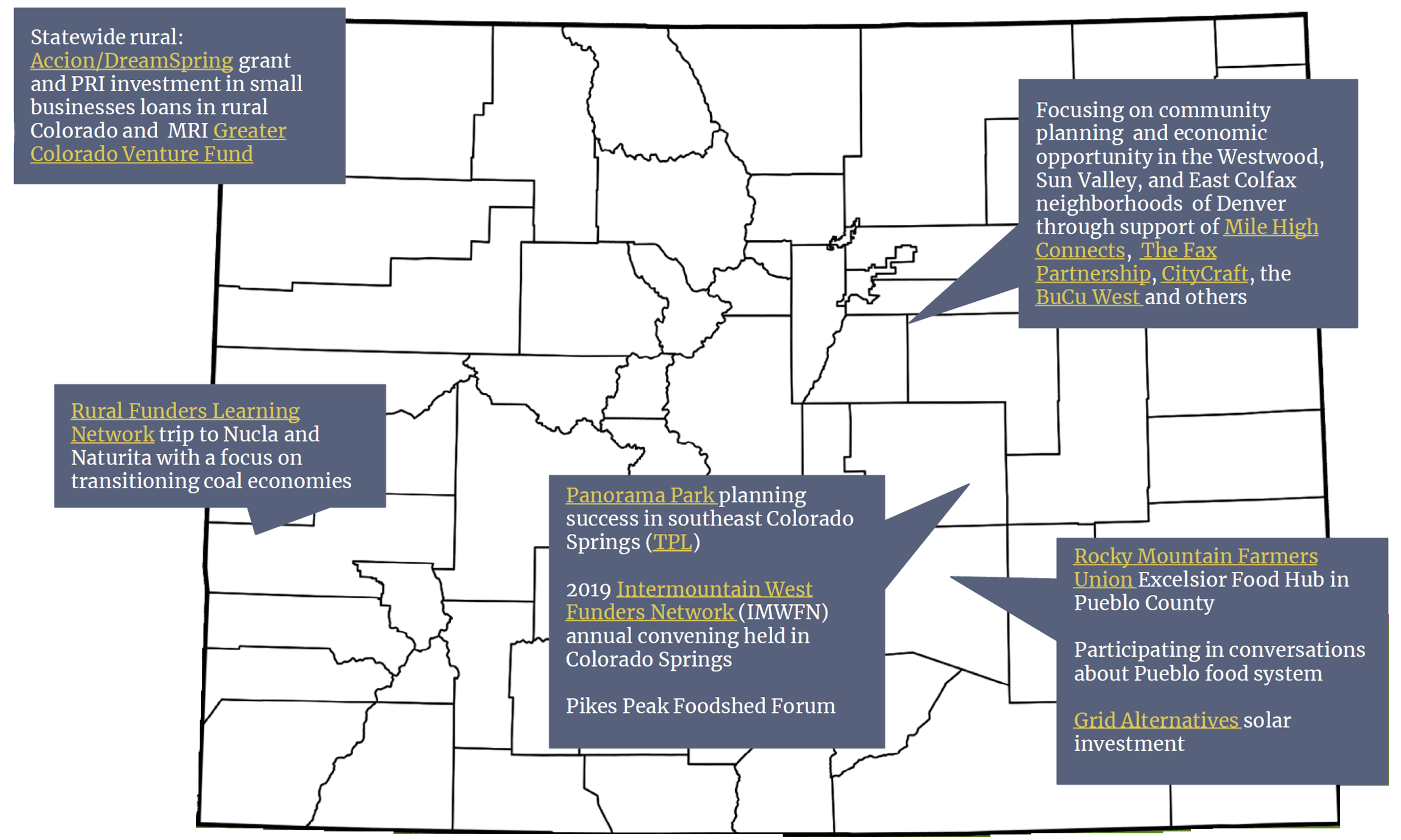 In 2019, the Community Development program committed $932,500 in strategic grants to 13 organizations and $465,000 in responsive capital grants to 12 organizations. New impact investments supporting vibrant communities in 2019 included a $500,000 MRI to
In 2019, the Community Development program committed $932,500 in strategic grants to 13 organizations and $465,000 in responsive capital grants to 12 organizations. New impact investments supporting vibrant communities in 2019 included a $500,000 MRI to 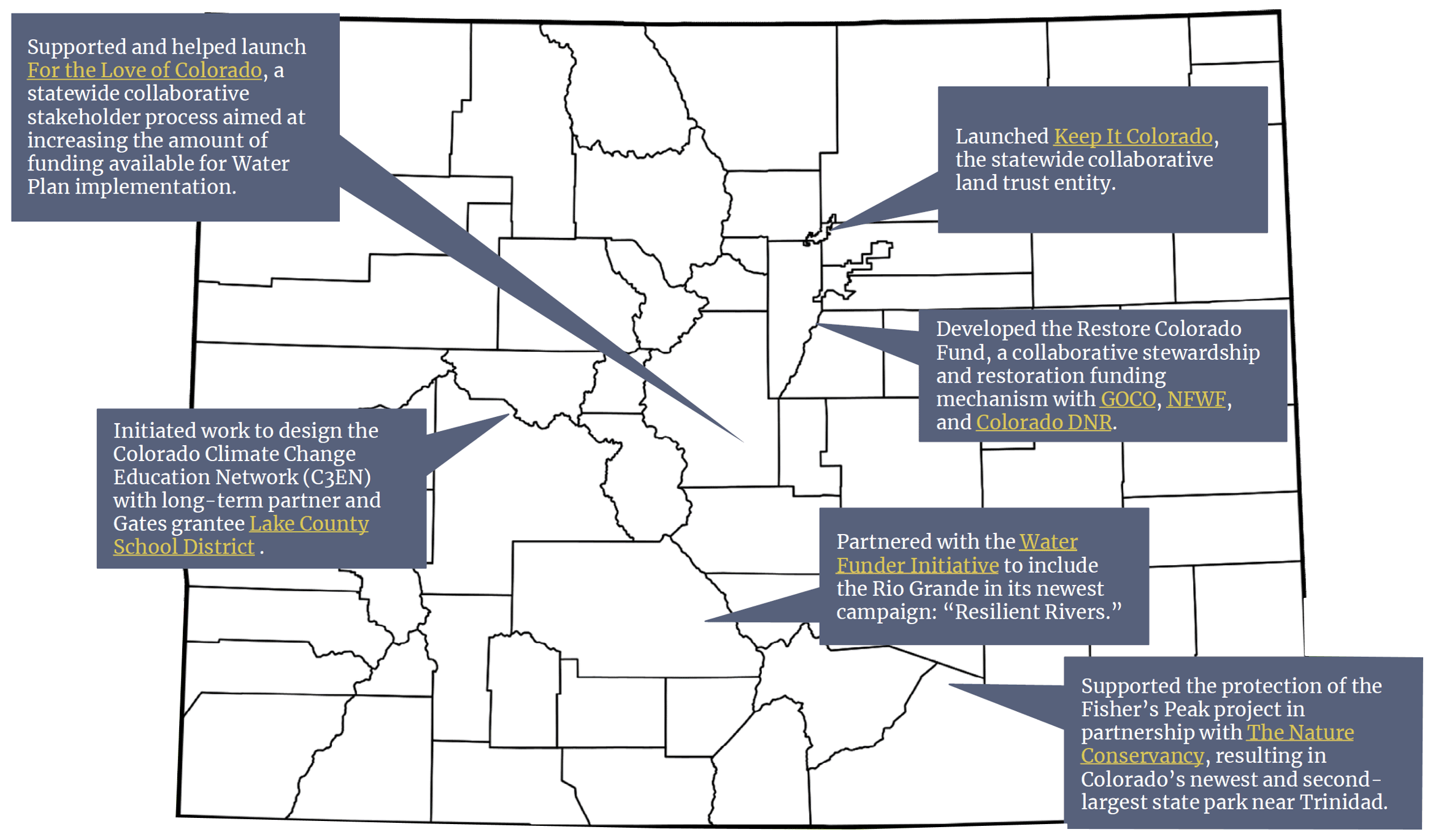 Our Focus Landscapes initiative, a key element of our Natural Resources program, underwent a comprehensive review, revision, and re-launch in 2019. This initiative was launched in 2011 to help Colorado achieve landscape-scale conservation through the protection of private lands in specific geographies. A great deal of progress was made in North Park, southeast Colorado, and the San Luis Valley, resulting in more than 200,000 acres of farm and ranch lands conserved, along with their associated ecological values. The strategic review process was done in close partnership with the land trust organizations representing those geographies, providing lessons-learned and an exploration of emerging opportunities. The revised Focus Landscapes initiative will first focus on two geographies:
Our Focus Landscapes initiative, a key element of our Natural Resources program, underwent a comprehensive review, revision, and re-launch in 2019. This initiative was launched in 2011 to help Colorado achieve landscape-scale conservation through the protection of private lands in specific geographies. A great deal of progress was made in North Park, southeast Colorado, and the San Luis Valley, resulting in more than 200,000 acres of farm and ranch lands conserved, along with their associated ecological values. The strategic review process was done in close partnership with the land trust organizations representing those geographies, providing lessons-learned and an exploration of emerging opportunities. The revised Focus Landscapes initiative will first focus on two geographies: 